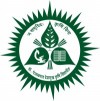About Department
Department of Soil Science and Agricultural Chemistry was established in the year 1969 with the formation of Punjabrao Krishi Vidyapeeth on 20th October, 1969, then renamed as Dr. Panjabrao Deshmukh Krishi Vidyapeeth, Akola on 17th April, 1992. The department was established to cater the needs of teaching, research and extension in the field of Soil Science and Agricultural Chemistry. The educational programmes leading to M.Sc. (Agri.) and Ph. D. in Soil Science and Agricultural Chemistry and Land Resource Management along with various research programmes and allied extension activities are conducted successfully.
The department has total intake capacity of 20 M.Sc. and two Ph.D. students in Soil Science and Agril. Chemistry and six M.Sc. and two Ph.D. students in Soil Science and Agril. Chemistry with specialization in Land Resource Management every year. The Center for Post Graduate Education and Research in Land Resource Management was established in the department in the year 1987 in collaboration with National Bureau of Soil Survey and Land Use Planning (ICAR), Nagpur. The main objective of the Center of Land Resource Management is to identify, generate and correlate the data required for land resource management for optimum utilization of limited land resources.
Academic Programmes
| Sr.No | Degree | Subject of Specialization |
Admission Capacity
|
|
|---|---|---|---|---|
|
Akola
|
Nagpur | |||
|
1
|
M.Sc. (Agri.) | Soil Science |
18 | 12 |
|
2
|
Ph.D | Soil Science and Agril. Chemistry | 5 | – |
One student each from B.Sc. (Hort. & B.Sc. (Forestry) admitted every year over and above intake capacity
Infrastructure Facilities
The well equipped laboratories are established in the Department with advanced instruments for soil, water, plant and manure samples analysis by the research staff as well as post graduate students.
| Sr.No | Name |
|---|---|
|
1 |
Soil Testing Laboratory |
|
2 |
Post Graduate Students Laboratory |
|
3 |
Soil Physics Laboratory |
|
4 |
Micronutrient and Heavy Metal Testing laboratory |
|
5 |
Soil Fertility Laboratory (Long Term Fertilizer Experiment) |
|
6 |
Instrumentation Cell |
Advanced Instruments
| Sr.No | Name |
|---|---|
|
1 |
Atomic Absorption Spectrophotometer |
|
2 |
Micro Processor Based Automatic Digestion and Distillation Apparatus |
|
3 |
UV-VIS Spectrophotometer |
|
4 |
Flame Photometer |
|
5 |
Micro Processor Based pH and EC Meters |
|
6 |
Yoders Apparatus |
|
7 |
Pressure Plate Apparatus |
|
8 |
Laminar Flow |
|
9 |
Centrifuge |
|
10 |
Micro Processor Based Automatic Soxhlet Apparatus |
|
11 |
Hot Air Oven |
|
12 |
Rotary Shaker |
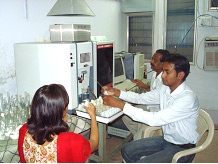 |
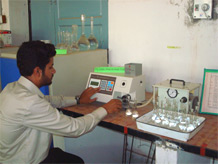 |
|
| Atomic Absorption Spectrophotometer | Flame photometer | |
 |
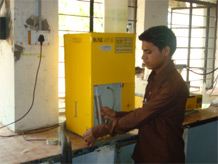 |
|
| Micro Processor Based Automatic Digestion Apparatus | Micro Processor Based Automatic Distillation Apparatus | |
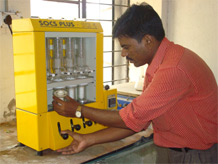 |
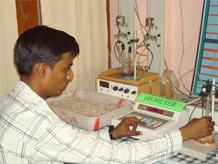 |
|
| Micro Processor Based Automatic Soxhlet Apparatus | Micro Processor Based pH Meter | |
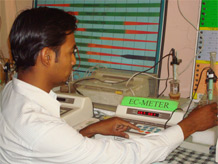 |
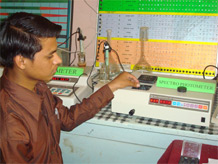 |
|
| Micro Processor Based EC Meter | UV-VIS Spectrophotometer |
Mandate
To impart education to post graduate students leading to M.Sc. (Agri) and Ph.D Degree in Soil Science.
To carry out the research on the fundamental and applied aspects in relation to soil-plant-water relationship.
To impart training to the staff of state government department as well as NGO in soil testing.
To collaborate with ICAR institutes and other Agril. Universities for development of education and research programme in the field of Soil Science.
Co-Curricular Activities:
The Akola Chapter of Indian Society of Soil Science is actively engaged in organizing Seminar / Symposia and guest lectures by eminent scientists in the field of Soil Science. There are 35 members of the chapter and most of them participate in various national , international seminars/workshops.
Research Activities
Research Themes
|
1
|
Integrated Nutrient Management |
|
2
|
Soil Quality/ Soil Health: Assessment and Enhancement |
|
3
|
Long Term Fertilizer Management |
|
4
|
Soil Mineralogy, Genesis, Survey and Classification |
|
5
|
Micronutrient Management |
|
6
|
Soil Biology |
|
7
|
Soil Carbon Sequestration |
|
8
|
Land Resource Management |
|
9
|
Land Evaluation |
|
10
|
Land Degradation and Restoration |
|
11
|
Crop Residue Management |
|
12
|
Dry Land Agriculture Technologies |
|
13
|
Watershed Management |
|
14
|
Remote Sensing and GIS for soil resource studies |
Research Achievements
- Generated technology for salt affected soils
- Evolved Integrated Nutrient Management technologies for various crops and cropping systems
- Delineated micronutrient status of soils of Vidarbha
- Generated dry land agriculture technology
- Generated technologies for soil resource studies using Remote Sensing and GIS
- Soil Quality evaluation under long term fertilizer experiment on sorghum-wheat
- Released recommendations on soil management and fertilizer use for the benefit of farmers
Research Projects
- All India Coordinated Research Project on Long Term Fertilizer
- All India Coordinated Research Project on Micro and Secondary Nutrients and Pollutant Elements in Soils and Plants (ICAR)
Extension Activities and Achievements
-
The soil, water, plant and manure samples received from farmers are analysed and the recommendations are given to the farmers for fertilizer use and management of soil.
- Farmers group for Soil Health and Land Use has been initiated in the Department for providing guidance to the farmers.
- Diagnostic team visits to the farmers fields for advice to the farmers in specific problems related to soil health, fertilizer use and soil resource management.
-
Guidance to a farmers regarding deficiency symptoms of various nutrients in plants by the faculty.
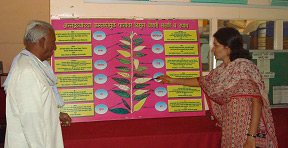
Rates of Analysis of soil, irrigation water, plant and manure samples
| Sr.No | Sample | Rate/Sample |
|---|---|---|
|
I |
Soil | |
|
1 |
pH | 10/- |
|
2 |
EC | 10/- |
|
3 |
Available N | 40/- |
|
4 |
Available P | 50/- |
|
5 |
Available K | 30/- |
|
6 |
Organic C | 40/- |
|
7 |
Calcium carbonate (CaCO3) | 25/- |
|
8 |
Micronutrients (Fe, Cu, Zn, Mn, B, Mo) | 75 each |
|
9 |
Exchangeable Ca, Mg, Na, & K | 50 each |
|
10 |
CEC | 125/- |
|
11 |
Lime requirement | 50/- |
|
12 |
Gypsum requirement | 50/- |
|
13 |
Mechanical analysis | 100/- |
|
14 |
Bulk density | 50/- |
|
15 |
Hydraulic conductivity | 100/- |
|
16 |
Water holding capacity | 100/- |
|
II |
Irrigation Water | |
|
1 |
Analysis of Na, Ca, Mg, CO3, Cl, HCO3 | 50 each |
|
2 |
pH | 10/- |
|
3 |
EC | 10/- |
|
III |
Plant | |
|
1 |
Total N | 50/- |
|
2 |
Total phosphorus | 50/- |
|
3 |
Total potassium | 50/- |
|
4 |
Micronutrients (Fe, Mn, Zn, Cu) | 100 each |
|
IV |
Manures | |
|
1 |
Total N | 150/- |
|
2 |
Total P | 300/- |
|
3 |
Total K | 150/- |
|
4 |
Organic Carbon | 200/- |
|
5 |
pH | 100/- |
6 |
EC |
100/- |
Research Recommendations (Approved in AGRESCO)
|
Name of Technology
|
Recommendation | |||||||||||||
|---|---|---|---|---|---|---|---|---|---|---|---|---|---|---|
|
Long term nutrient management for sustaining soil quality and crop productivity in sorghum – wheat cropping sequence |
In sorghum- wheat cropping sequence, on the basis of 20 years results of long term fertilizer experiment, for sustaining soil quality and crop productivity application of recommended dose of fertilizer along with FYM @ 10 t ha-1 is recommended. |
|||||||||||||
|
Integrated nutrient management for sustaining soil fertility and crop productivity in sorghum – wheat cropping sequence |
On Vertisol under sorghum-wheat sequence for obtaining maximum yield of sorghum and wheat and to maintain soil fertility status of soil for longer period, a dose of 100: 50: 40 kg NPK ha-1 + FYM @ 10 t ha-1 to sorghum and 120 : 60 : 60 kg NPK ha-1 to wheat (irrigated) is recommended |
|||||||||||||
|
Long term nutrient management in soybean – wheat cropping sequence |
For sustaining the productivity and fertility of soils under soybean – wheat sequence, it is recommended that 50% N through organic materials and remaining 50% N through chemical fertilizer alongwith 20 kg sulphur and 2.5 kg Zn ha-1 to soybean and recommended dose of fertilizer should be applied to wheat. |
|||||||||||||
|
Sulphur management in crop production(Soybean and wheat) |
It is recommended that 20 kg sulphur through gypsum should be applied for obtaining maximum yield and higher B : C ratio under soybean – wheat sequence on sulphur deficient soil. |
|||||||||||||
|
For maintaining soil fertility and obtaining maximum yield of pigeon pea on sulphur deficient soil, application of 20 kg sulphur ha-1 is recommended with 25 kg N and 50 kg P2O5 |
||||||||||||||
|
Integrated nutrient management in rainfed cotton |
For cotton under rainfed conditions 50% recommended dose of fertilizer ( 25 kg N + 12.5 kg P ha-1 ) in combination with FYM @ 5 t ha-1 or application of green loppings of glyricidia at 30 DAS should be applied for getting higher B : C ratio and improvement in soil physical and chemical properties |
|||||||||||||
|
Nutrient management in cotton through drip irrigation System |
It is recommended that the dose of fertilizer can be reduced to 50% recommended dose of fertilizers through fertigation to cotton for achieving the yields comparable with 100% recommended dose of fertilizer through conventional method (soil application). |
|||||||||||||
|
Integrated nutrient management in oilseeds |
Application of 15 t FYM ha-1 + 40:60:40 kg NPK ha-1 + 25 kg sulphur through gypsum should be applied + spraying of 0.2% borax during flowering for obtaining maximum yield of sunflower |
|||||||||||||
|
Spraying of urea @ 2% at 50 and 70 DAS along with recommended dose of NPK (soil application) is beneficial for obtaining maximum yield of soybean |
||||||||||||||
|
Micronutrient management in crop production in Soybean, Cotton and Mustard |
It is recommended that soybean seeds should be treated with Rhizobium + PSB (each 25 g kg-1 seed) and 4 g ammonium molybdate per kg seed alongwith recommended dose of chemical fertilizers. |
|||||||||||||
|
For cotton crop, critical limit of iron in soil and in plant (fully mature leaves) is recommended as 4.5 ppm for soil and 281 ppm for plant. |
||||||||||||||
|
For obtaining maximum yield and higher B:C ratio of soybean- mustard cropping sequence, on zinc deficient soil under 3 t FYM ha-1 + ½ recommended dose of chemical fertilizers (15:37.5 kg N & P) + 10 kg ZnSO4 with Rhizobium and PSB should be applied for soybean and 50 kg N + 20 kg P ha-1 + PSB should be applied for mustard |
||||||||||||||
|
Soil, Nutrient and Moisture conservation through land management (Cotton and Greengram ) |
Deep ploughing once in two years is recommended for reducing the loss of soil, water and nutrients from 1.5% sloppy deep black soils. |
|||||||||||||
|
Soil, Nutrient and Moisture conservation through contour cultivation and live hedgerows (Sorghum and Cotton ) |
Application of 50% RDF + FYM @ 10 t ha-1 with contour cultivation alongwith established vetiver or leucaena hedge rows is recommended to cotton-sorghum rotation grown on Vertisols for obtaining higher monetary returns and reduction of surface runoff and losses of soil and nutrients. |
|||||||||||||
|
Management of salt affected soils of Purna valley (Cotton and greengram ) |
Broadcasting of gypsum in powder form @ 2.5 t ha-1 (50% GR) + 5 t FYM or 2.5 t pressmud cake ha-1 before sowing of crop is recommended for increasing the productivity of cotton, sorghum and green gram as well as improving the physico – chemical characteristics of sodic soils of Purna valley. |
|||||||||||||
|
Application of 2.5 t gypsum ha-1 before sowing and opening of deep furrows after two rows of crops at 30 DAS, is beneficial for reducing the sodicity of soil. |
||||||||||||||
|
Application of 2.5 t gypsum ha-1 once in two years is recommended for improving the physico-chemical characteristics of Purna valley soils |
||||||||||||||
|
Management of salt affected soils of Purna valley by irrigation and crop residue application (Cotton and Greengram) |
It is recommended to incorporate gypsum @ 25% GR (1.25 t ha-1) in soil and pass the alkali water through gypsum bed of 30 cm thickness for getting higher yield of irrigated cotton and B:C ratio and for improving soil characteristics of sodic Vertisols of Purna valley. |
|||||||||||||
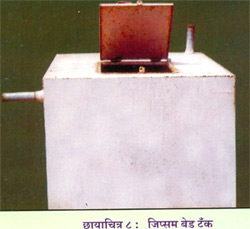 |
||||||||||||||
|
For improving the characteristics of sodic Vertisols of Purna valley and for obtaining maximum yield of green gram – safflower and B:C ratio, it is recommended to incorporate crop stubbles @ 2 t ha-1 + 10 kg PSB ha-1 alongwith 50% recommended dose of fertilizers and irrigate the crops with alkali water which is passed through 30 cm thick gypsum bed. |
||||||||||||||
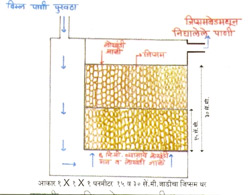 |
||||||||||||||
| PDKV method of Compost preparation |
|
|||||||||||||
|
Nutrient management in rice in eastern Vidarbha zone (Paddy) |
For rice on medium soil in eastern Vidarbha region for obtaining maximum yield and higher B : C ratio, a fertilizer dose of 125 : 62.5 : 62.5 kg NPK ha-1 through chemical fertilizer should be applied. |
|||||||||||||
|
For obtaining maximum yield and higher B : C ratio of kharif rice crop, recommended dose of P and K during transplanting and 25% N through glyricidia and 75% N through urea is recommended. |
||||||||||||||
|
In eastern Vidarbha region for maximum yield and higher B : C ratio in rice and improving characteristics of soil, 5 t biogas slurry ha-1 should be applied with 50% recommended dose of fertilizer (47 : 23 : 25 kg NPK ha-1 ). |
Publications
Research Bulletins
- Quality of irrigation water : Criteria and standards
- Soil : CRS,CDF, Agriculture College Farm, Nagpur
- Micronutrients in soils and plants
- Organic recycling for sustainable crop production
- Phosphorus status of Vidarbha soils
- Role of Potassium in crop production
- Soils : Dr. PDKV., Research/Demonstration Farms at a Glance
- Salt affected soils of Purna valley in Vidarbha, Res. Bull. No. 83, 2000
- Lecture notes of Winter School on Integrated Nutrient Management for Sustainable Agriculture (September, 3-23, 2002)
- Long term effect of fertilizers application and cropping on the sustenance of soil quality and productivity under sorghum-wheat sequence in Vertisol (2004)
- Lecture Notes of Workshop on Integrated Nutrient Management (Aug. 3-4,2004)
- Glimpses of Recent Soil Science Research (2004)
- Profile and Progress (2004)
- Micronutrient Status in Soils of Vidarbha (2004)
- Watershed based land use planning on rainfed Agro-eco system (2004)
Contact Information
Dr. Sanjay M. Bhoyar
Head
Department of Soil Science,
Dr. Panjabrao Deshmukh Krishi
Vidyapeeth, Akola
Ph. 0724-2256212
hdchemistry@pdkv.ac.in
